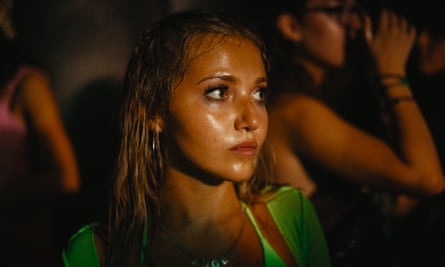Mia McKenna-Bruce had watched How to Have Sex just once before it screened at this year’s Cannes film festival. The first viewing had been in London: an intimate, cast-and-crew-only affair. Between marvelling at the visuals, score, edit, and cheering on the rest of the performances, she had little time to take in what was actually unfolding on screen.
“I may have also been too shocked to fully comprehend the situation,” McKenna-Bruce reflects, “It wasn’t until the Cannes Film Festival in May that I was able to truly process and absorb what had happened to Tara, my character. I sobbed uncontrollably. The film really captures her journey and the subtleties of her experiences in a way that I never thought possible. It was an overwhelming experience.” The audience at Cannes gave How to Have Sex an eight-minute standing ovation, leading to it winning the Un Certain Regard award, which typically recognizes up-and-coming filmmakers. This recognition is well-deserved. The film serves as an impressive debut for writer-director Molly Manning Walker, and McKenna-Bruce’s performance is nuanced and remarkable.
In the movie, McKenna-Bruce, who is 26 years old, portrays one of three 16-year-old girls who embark on a trip to Malia, the party capital of Crete, after their GCSE exams. What begins as an exciting journey of self-discovery for these young adults takes a subtle but troubling turn when McKenna-Bruce’s character, Tara, faces pressure from her friends to lose her virginity. “The emotions at the beginning are very different from those at the end,” explains McKenna-Bruce. “The change is gradual and intentionally disorienting at times, reflecting the experience of sexual assault.”

We will gather for lunch at a peaceful pub in Kent during the beginning of October. It has only been five months since our last meeting in Cannes, but for McKenna-Bruce, it feels like a lifetime. This is mostly due to the fact that she gave birth to her first child just five weeks ago. Despite this, she appears composed and put-together in her sleek black turtleneck and sunglasses perched on her forehead. “Don’t be fooled, this is all just a facade,” she jokes, motioning to her outfit. “The first few weeks were chaotic, but now I feel like I’m regaining some sense of normalcy. I’ve stopped crying all the time.”
McKenna-Bruce, known for her roles in The Witcher, Vampire Academy, and the Netflix adaptation of Jane Austen’s Persuasion (where she played Mary Musgrove, the younger sister of Dakota Johnson’s Anne Elliot), hopes that this role will be a game-changer for her career. She has dedicated a lot of time and effort to get to this point. Growing up in New Eltham, south-east London, she began attending dance school at the young age of two. Believing that she needed an American accent to succeed, McKenna-Bruce spoke with an American accent throughout most of her primary school years – at home, in class, and everywhere else.
She laughs and says, “Seriously, why didn’t anyone stop me? I was just so fixated on Shirley Temple.”
At the age of eight, she had her first experience acting in the West End portraying a ballet student in Billy Elliot the Musical. She then went on to appear in EastEnders, where she played Jack Branning’s daughter. Her character was involved in a car accident that resulted in a severed spinal cord. She also starred in The Fourth Kind at the age of nine, playing a blind girl who lost her vision after witnessing her father’s suicide. She notes that this character required an American accent, which she had already practiced. By the time she was finishing primary school, she had landed an audition for BBC’s Tracy Beaker series. In total, she spent seven years working on various spin-offs of the franchise.
“The show was geared towards children, but it also tackled serious topics,” she explains. “My character’s plot revolved around having a mother in an abusive relationship, with the overall context being focused on young people in the foster care system.”
I find the content to be quite weighty for a child. “That’s always been my preference,” she responds. “I aspire to tell intricate tales. It wasn’t until shooting How to Have Sex that I truly recognized the pattern.”

According to the actress, things feel a bit bittersweet now that she has a big opportunity in her future. She mentions that with the arrival of her baby, acting is no longer the most important thing in her life. It’s also a welcome change to be able to leave the house. Promoting the film while caring for a newborn requires a lot of planning and organization. She reveals that her sister is currently watching the baby in a nearby room. There are several more festivals coming up before the film’s official release, and she plans to fully immerse herself in the promotional events while also tending to her baby’s needs.
In December 2020, McKenna-Bruce received an initial version of the script for How to Have Sex. As she read through it, she was reminded of her own experiences from ten years ago. She recalls going on vacation as a rite of passage, specifically to Ibiza. She noticed that the script was written by a young person who understands the topic well. It not only addresses sex and consent, but also delves into the intense emotions and challenges that come with growing up, being a girl, and maintaining friendships.
The individual explains that one does not immediately know how to handle such situations or how to communicate about them. We follow Tara as she begins to question whether she enjoyed what took place and how to express her feelings. This leads to a unraveling of emotions. As it is her first experience, she wonders if this is how it is supposed to be and if she made any mistakes. She has no previous experience or guidance to compare it with. Often, one’s first time can be difficult due to the complexities involved. Without any prior knowledge or support, it becomes challenging to navigate. The hope is that this film can serve as a point of reference.
Bypass the advertisement for the newsletter.
after newsletter promotion
The movie was filmed in Malia for a duration of two months, from September 2021. The director mentioned that there were still vacationers present at the beginning, but by the time they finished filming, the town was deserted.
The party scenes were filmed in the initial weeks, while the nightclub scenes were expertly captured: the rush of adrenaline, disorientation, and elation; the pulsing, lively beats. “We were truly immersed in those clubs, dancing to the music. There were often hundreds of people there: a sea of individuals.” The actors may not have consumed alcohol during night shoots, “but we were incredibly energetic, and we would twirl around in circles multiple times before scenes to create a disorienting effect. It was a heightened experience to make this movie while people were out partying, including girls who were the same age as the characters.” Nevertheless, the cast and crew managed to fit in some partying during their free time. It could be considered a method acting approach.
McKenna-Bruce explains that she truly experienced the stillness that followed the events at Tara, transitioning from excitement to loneliness. She felt as if she was living through a crash. In capturing this shift, McKenna-Bruce wanted to convey the intense and muted emotions that Tara was feeling. The film does not normalize Tara’s experience, but it also does not overly dramatize it. Instead, it portrays the reality of what can and often does happen. Interestingly, while filming the aftermath of the assault, it affected the male actors more than the female actors. For the female actors, it was not a shock as they were familiar with these types of stories. However, for the male actors, seeing it unfold in real time was eye-opening.
Having been involved in significant acting roles early on, McKenna-Bruce recognizes the weight of responsibility that comes with roles like Tara. In fact, that was one of the aspects that drew her to the role. She is eager to continue discussing the thought-provoking questions presented in the film even when she is not on screen: “I cannot say I want to start conversations and then not engage when given the opportunity.” Before the movie’s release, she has attended a few screenings. “I was expecting it to primarily resonate with teenagers, but there have already been numerous individuals – teenagers, people my age, and even older generations – who have opened up about their own similar experiences to those portrayed in the film. Many, particularly older women, shared that they had never truly addressed their emotions or even realized how deeply it had affected them.”
One particular encounter was memorable. “There was an elderly gentleman at one of the showings who was very distressed. He claimed to have seen his younger self in one of the male characters.” The team’s goal was to provide a platform for viewers to contemplate, which they achieved by avoiding the portrayal of any character as a monster, victim, or villain. They simply tell the story.
In the upcoming week, McKenna-Bruce’s 16-year-old sister will watch the movie for the first time. “I am curious to see her interpretation of it, as I have a specific message I want her to understand: do not succumb to external influences such as friends, social media, etc. You are not obligated to do anything before you are ready.”
The film “How to Have Sex” will be released in theaters on November 3rd.
Source: theguardian.com


